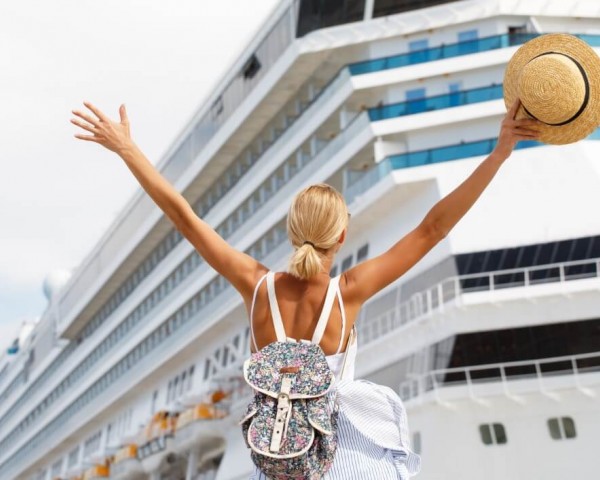In 2023, Greece saw a surge in foreign tourists, setting a new record. Despite challenges like heat waves and fires, visitors flocked to the Aegean islands and historical sites, savoring the delights of traditional Greek cuisine. With 2024 predicted to surpass this record, concerns about potential over-tourism issues are mounting.
The Greek government, mindful of the pitfalls experienced by other over-tourism hotspots like Venice, Amsterdam, the Canary Islands, the Balearic Islands, and Barcelona, is contemplating restrictions on cruise ship arrivals. The iconic Santorini is at the center of these deliberations.
Cruise Passengers with Limits
The Greek Prime Minister, Kyriakos Mitsotakis, announced a few weeks ago that the government is considering imposing restrictions on cruise ships visiting its most popular islands to address the issues caused by “over-tourism” in overcrowded areas. Mitsotakis did not specify where, when, or how the new policy will be implemented. Still, he suggested that the limitations could involve restrictions on docking locations for ships or the introduction of a tender system. The proposed measures are expected to be in place by 2025.
Experts are drawing attention to the strain on Santorini, a beloved destination renowned for its stunning coastlines, cliffs, and whitewashed houses. The island’s charm is being tested by the sheer volume of cruise visitors, leading to concerns about overcrowding and security. Greek Prime Minister Mitsotakis has acknowledged the pressure on Santorini and Mykonos and stressed the need to address the issue, with Santorini bearing the brunt of over-tourism’s impacts.
Alarming Data
Due to its unique conditions, tourism plays a significant role in Santorini. The island, home to around 15,000 permanent residents, attracts a much larger number of visitors. According to the Hellenic Association of Ports, in 2023, approximately 800 ships docked at the island, bringing in 1.3 million tourists, making it the primary island destination in the country. The island’s airport is also experiencing high levels of activity.
This summer, Santorini is expected to welcome 3.4 million tourists, which has led local councilor Nikos Zorzos to express concerns about the island’s capacity to accommodate more visitors. He has stated that the island cannot accommodate “a single bed” and anticipates a challenging year ahead.
The European Commission’s data from 2018 reveals that despite having only 15,500 residents and an area of 76 square kilometers, Santorini received an average of 107.8 visitors per 100 inhabitants per day, generating an annual turnover of one billion euros.
Excessive Tourism
The report on the impact of ‘over-tourism’ from Brussels issued a stark warning for Santorini. It emphasized the crucial need for effective policies to manage and regulate the increasing tourist numbers, thereby minimizing the negative effects on the local community. These measures are desirable and essential to maintain the destination’s reputation, prevent decline, and preserve the island’s unique appeal.
Despite the authorities’ efforts to reduce the number of cruise ships, local authorities have requested limits since 2012. Even before the pandemic, they had successfully imposed a cap of 8,000 daily visitors from cruise ships and a maximum duration for the ships’ stays on the islands.
There has been a new controversy about Santorini, cruise ships, and many visitors. It is reported that a local official, Panos Kavallaris, allegedly asked residents to limit their movements around the island due to the imminent arrival of around 17,000 cruise ship passengers. The request was supposedly made through social media, but it sparked much attention, and Kavallaris reportedly deleted the message shortly after.
The Great Dilemma
The success of tourist destinations like Santorini and Greece has created a dilemma. While the Greek government and the European Union acknowledge that the high number of visitors can negatively affect the local population, they also recognize that tourism is a vital industry that generates significant economic activity and employment opportunities.
Julia Simpson, the president of the World Travel & Tourism Council (WTTC), stated a year ago that the travel and tourism sector contributed over 19% to the Greek economy. The positive outcomes of 2023 and the expected trends for this summer have increased demand for jobs during the peak season.












